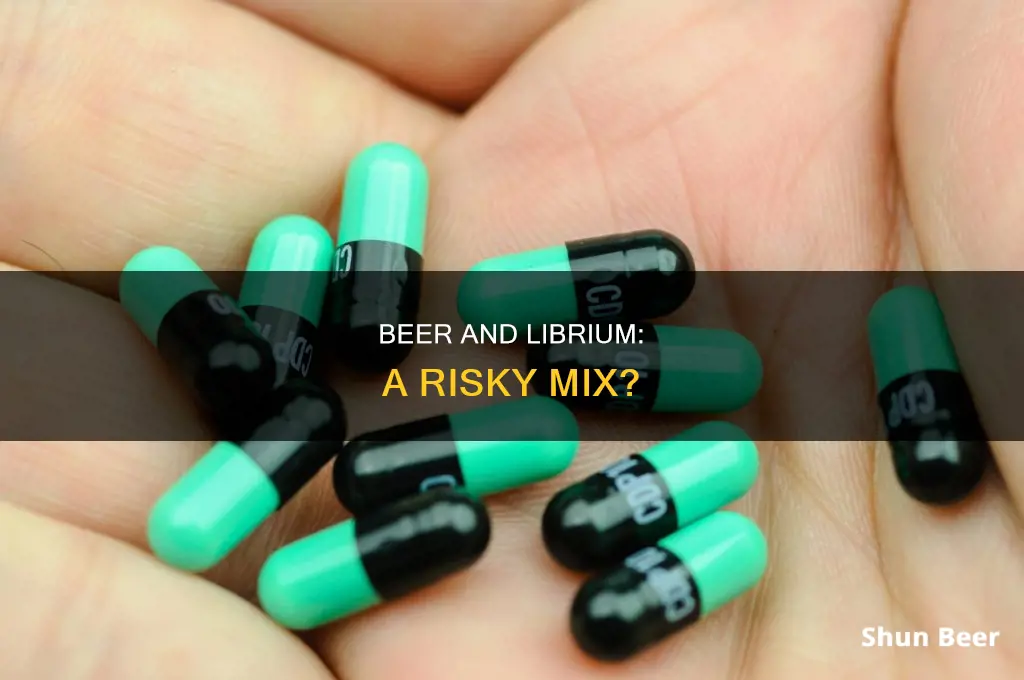
Librium, a brand name for the generic chlordiazepoxide, is a benzodiazepine used to treat anxiety, anxiety disorders, and withdrawal symptoms in alcohol treatment. It is a highly addictive medication that affects neurotransmitters to create a calming, sedated effect. While Librium can be effective in reducing withdrawal symptoms, mixing it with alcohol can be dangerous. Both Librium and alcohol are depressants that work on nerve activity in the brain and nervous system. When combined, they further depress nerve activity, creating severe risks to basic life functions such as heart rate, breathing, and blood pressure. This can lead to negative effects such as drowsiness, confusion, difficulty breathing, and even coma or death. Therefore, it is not recommended to drink alcohol while taking Librium, as it can intensify the effects of both substances and increase the risk of overdose and severe health complications.
| Characteristics | Values |
|---|---|
| What is Librium used for? | To sedate patients and reduce nerve activity. It is commonly used to treat anxiety, anxiety disorders, and withdrawal symptoms in alcohol treatment. |
| How does Librium work? | It is a benzodiazepine that operates on the nerves of the central nervous system with a sedative effect that lowers the level of nerve activity. |
| Is Librium addictive? | Yes, it is highly addictive. |
| Can you drink alcohol while taking Librium? | It is not recommended as it can cause unexpected results when mixed with alcohol, such as blacking out while remaining fully conscious. Mixing Librium and alcohol can lead to coma or even death. |
| What are the side effects of Librium? | Mild common side effects include digestive issues, drowsiness, dizziness, fatigue, weakness, headache, blurred vision, restlessness, and excitement. More severe side effects include difficulty breathing or swallowing, irregular heartbeat, shuffling walk, tremors, inability to sit still, and yellowing of the skin or eyes (jaundice). |
| What is the typical Librium dosage? | It depends on the severity of withdrawal symptoms, but it is typically prescribed for a few days to a week. The dosage may range from 5 mg to 25 mg, taken every few hours or several times a day. |
| What are the precautions when taking Librium? | Librium is highly addictive and can cause dependence, especially if taken for extended periods. It is important to have a support system in place, such as therapy, while taking this medication. |
What You'll Learn
- Librium is used to treat alcohol withdrawal
- Mixing Librium and alcohol is dangerous and can lead to coma or death
- Librium is addictive and can cause dependency
- Librium is typically prescribed for a short period of time
- Librium has a range of side effects, including drowsiness, dizziness, and blurred vision

Librium is used to treat alcohol withdrawal
Librium is the brand name for the generic chlordiazepoxide, a benzodiazepine medication that is approved to treat acute alcohol withdrawal. It is a long-acting benzodiazepine that has anti-anxiety and sedative properties. Librium is often used in a medical detox setting to help people in treatment for alcohol addiction who are at risk for or have alcohol withdrawal syndrome.
Librium is particularly useful in treating alcohol withdrawal because its long-acting properties may prevent the emergence of alcohol withdrawal symptoms, alleviate intense withdrawal symptoms, and reduce the risk of rebound symptoms (such as seizures). Benzodiazepines like Librium are considered the first-line treatment for alcohol withdrawal. They help keep patients safe and comfortable by minimizing moderate to severe withdrawal symptoms as the body returns to a stable state.
Librium is typically only taken for a few days to a week during the initial stages of alcohol withdrawal. The dosage is determined by a doctor and may be fixed or symptom-triggered. Most tablets are 5, 10, 20, or 25 mg. Librium is popular as it has a long half-life, making it less likely that rebound symptoms will occur later in the detox process.
While Librium can be an effective tool in treating alcohol withdrawal, it is not a cure-all and should be combined with therapy and careful monitoring from a trained professional. It is also a highly addictive substance, so it should not be taken any longer than necessary.
Breaking into the Beer Industry: A Guide to Success
You may want to see also

Mixing Librium and alcohol is dangerous and can lead to coma or death
Librium is a brand name for the chemical compound called chlordiazepoxide, a benzodiazepine. It is a drug that doctors use to sedate patients and reduce nerve activity. It is commonly used to treat anxiety, anxiety disorders, and withdrawal symptoms in alcohol treatment. Librium is often prescribed to reduce or avoid symptoms of alcohol withdrawal, such as anxiety and overactive systems.
However, mixing Librium and alcohol is extremely dangerous and can lead to severe consequences, including coma or even death. Both Librium and alcohol are depressants that work on nerve activity in the brain and nervous system. When combined, they further depress nerve activity, creating severe risks to basic life functions like heart rate, breathing, and blood pressure. This can result in drowsiness, confusion, and difficulty breathing for extended periods.
Additionally, the risk of overdose increases significantly when mixing medications with alcohol. In the worst-case scenario, an overdose can lead to a coma or death. Librium is already a highly addictive substance, and mixing it with alcohol can enhance the potential for abuse and addiction.
It is crucial to understand that Librium is meant to assist in the initial stages of alcohol withdrawal and should not be taken for longer than necessary. During this time, it is essential to have a prescription supervised by a doctor, who will determine the appropriate dosage and duration. Attempting to detox from alcohol without medical assistance can be life-threatening.
Beer Transfer Mechanics: How Does It Work?
You may want to see also

Librium is addictive and can cause dependency
Librium is a highly addictive medication. It is a benzodiazepine that affects brain chemicals to ease anxiety symptoms. It is used primarily for the treatment of anxiety disorders and alcohol withdrawal symptoms. It is also sometimes used to treat insomnia.
Librium is a prescription medication and should only be taken as prescribed. If you take larger amounts than prescribed or take it for longer than instructed by your health care provider, it can be habit-forming. Misusing habit-forming drugs like Librium can lead to addiction or even overdose or death.
Librium abuse occurs when someone uses this prescription drug outside of how it is intended or prescribed to be used. Examples of Librium abuse include taking higher doses than prescribed, taking the drug for longer than instructed, using the medication without a prescription, taking Librium only for certain effects such as to feel "high", and combining Librium with other substances.
Abusing Librium can cause impaired cognitive and physical function, including a drastic decrease in blood pressure and heart rate. At high doses or when combined with other central nervous system depressants, Librium's sedative effect can depress lung function to the point of failure, which can be fatal.
Librium abuse differs from Librium addiction. Substance abuse patterns typically manifest in social, physical, and interpersonal problems. Substance addiction is characterised by physical dependence, resulting from increased tolerance and escalating drug use, and behavioural signs such as wanting to quit but being unable to.
Other behavioural and physiological signs of Librium addiction include obsessive thoughts and behaviours related to Librium, loss of interest in activities that were once enjoyable, inability to quit using Librium despite knowledge of its harmful effects, increased tolerance to the drug, and the presence of withdrawal symptoms when attempting to quit.
Beer and Blood Work: What's the Connection?
You may want to see also

Librium is typically prescribed for a short period of time
Librium is a brand name for the generic chlordiazepoxide, a benzodiazepine. It is used to treat anxiety disorders and acute alcohol withdrawal. Librium is typically prescribed for a short period of time, often for less than a month, to help individuals manage withdrawal symptoms and reduce cravings. The medication is designed to be taken for a short duration due to its potential for abuse, overdose, and addiction. Prolonged use of Librium can lead to increased tolerance and a higher risk of addiction.
Librium is often prescribed to help individuals undergoing alcohol withdrawal manage their symptoms. Alcohol withdrawal can be a dangerous and unpleasant process, and Librium helps to regulate the nervous activity in the brain, reducing the intensity of withdrawal symptoms. The medication is particularly effective in the initial stages of withdrawal, helping individuals manage the first wave of intense symptoms.
The length of Librium treatment can vary depending on the individual's needs and the severity of their withdrawal symptoms. Most people will take Librium for a few days to a week, under the supervision of a doctor. The dosage of Librium is typically tapered over time, gradually reducing the amount until it is no longer needed. This gradual reduction helps to minimize withdrawal symptoms from Librium itself.
Librium is a valuable tool in the detoxification process, but it is not a cure-all. It should be combined with therapy, careful monitoring by trained professionals, and a supportive environment to foster long-term sobriety. While Librium can help manage the physical symptoms of alcohol withdrawal, it does not address the underlying psychological aspects of addiction.
It is important to note that Librium is a highly addictive medication. Therefore, it should be taken for the shortest time possible and under the supervision of a medical professional. During Librium treatment, it is crucial to abstain from alcohol consumption as mixing the two can lead to dangerous and unexpected results, including blackouts, comas, or even death.
Beer Before Workout: Good or Bad Idea?
You may want to see also

Librium has a range of side effects, including drowsiness, dizziness, and blurred vision
Librium is a highly addictive medication that is used to treat anxiety, anxiety disorders, and withdrawal symptoms in alcohol treatment. It is also used to reduce anxiety before surgical procedures and can help persons with a wide range of behavioural disorders. Librium is typically prescribed for a short period, often only a few days to a week, and should be used with caution due to its potential for abuse and addiction.
In addition to the mild side effects, Librium can also cause more severe health risks. These include difficulty breathing or swallowing, irregular heartbeat, a shuffling walk, tremors, and inability to sit still. In some cases, individuals may experience yellowing of the skin or eyes (jaundice). It is crucial to consult a doctor if any of these side effects occur, as they may interfere with daily activities and well-being.
While Librium can be an effective tool in treating alcohol withdrawal, it is important to refrain from consuming alcohol during the treatment. Mixing Librium with alcohol can lead to dangerous synergistic effects, amplifying the depressant impact on the central nervous system. This combination may result in losing consciousness or blacking out while remaining fully conscious, posing a significant risk to the individual. Therefore, it is strongly advised not to consume alcohol while taking Librium to ensure safety and effectiveness during the treatment.
Bottoms Up Beer Dispensers: How Do They Work?
You may want to see also
Frequently asked questions
No, you should not drink alcohol while taking Librium. Mixing the two can cause a blackout where you remain fully conscious. It is highly dangerous and can lead to coma or death.
Mixing Librium and alcohol creates what is known as a synergistic effect. The combined depressive effects on the central nervous system are amplified. While under the influence of both Librium and alcohol, a person may lose consciousness or blackout while remaining fully conscious.
When Librium is mixed with alcohol, it can negatively affect heart rate and breathing. Patients may experience drowsiness, confusion, and difficulty breathing for extended periods of time. If they continue drinking, their case may be severe and may lapse into a coma and even death.
Librium withdrawal symptoms include high levels of anxiety, depression, tremors, agitation, and seizures.







